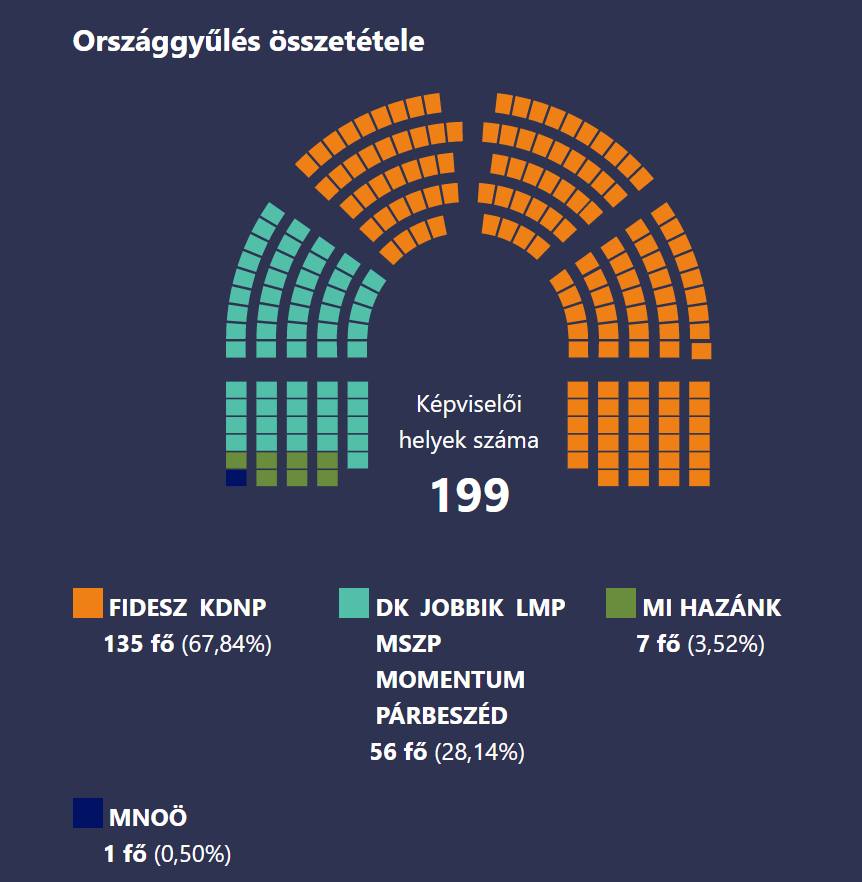Hungary – Victory had seemed to be a foregone conclusion for the Fidesz-KDNP government coalition for several weeks now, but its magnitude has nevertheless surprised more than one observer. Viktor Orbán has, for the fourth consecutive time, obtained two-thirds of the seats in Parliament, while his opponents’ unified strategy proved to be a bitter failure. Another surprise in this election: the nationalist movement Mi Hazánk (Our Fatherland), led by the mayor of Ásotthalom, László Toroczkai, exceeded the 5% mark and thus is entering Parliament.
Fourth consecutive constitutional majority
In his victory speech, when all the ballots had not yet been fully counted, the Hungarian Prime Minister declared:
“We have won such a great victory that it can be seen from the Moon, and certainly from Brussels.”
The coalition that has been in power since 2010 indeed won a fourth consecutive victory and retained its two-thirds majority in Parliament, allowing it to pass organic laws and constitutional amendments.
Of the 199 seats in Parliament, 135 will be occupied by deputies from the 12-year governing majority. The Fidesz-KDNP coalition obtained 53.10% of the votes cast and thus exceeded its 2014 (45.04%) and 2018 (49.60%) performances, while in 2010 it had obtained 52.73% in the first round and 53.81% in the second (in 2010 the legislative elections still took place in two rounds).
As in 2018, obtaining this qualified majority in Parliament came as a surprise, including among the most optimistic observers of Fidesz-KDNP’s performance.
This electoral result for Fidesz is the best in terms of the number of votes cast since the municipal elections of autumn 2006, while for the first time turnout was higher in a rural region — in Vas County, in western Hungary, which is a Fidesz stronghold — than in Budapest. At the national level participation was at 67.8% of eligible voters, as opposed to 68.13% in 2018 and 61.73% in 2014. This is a historic victory, which everyone agrees is partly the result of the new situation created by the outbreak of the Russian-Ukrainian war.

Regarding his opponents, who since the beginning of the year have struggled to gather their forces behind their figurehead, Péter Márki-Zay, Viktor Orbán declared:
“The [Hungarian] left has been Soros’s worst investment, because for twelve years it’s only been taking his money away from him […] Now is when we had the most to fight against. The mainstream international press – and, at the end of the campaign, the Ukrainian president as well – we have never had so many opponents”.
The opposition in tatters
The opposition had united behind Péter Márki-Zay and was comprised of DK, Jobbik, the LMP, Momentum, and Párbeszéd. By obtaining only 35.04% of the vote and 56 seats in Parliament they have suffered a terrible setback, putting this coalition’s viability as an alliance of political parties in question on Sunday evening.
The opposition did not manage to win all the constituencies of Budapest as expected, and ended up in the lead in only two provincial constituencies. The head of the list, Péter Márki-Zay, was largely beaten on his own home ground against János Lázár in the 4th constituency of the Csongrád-Csanád region (52.37% to 39.58%).
Unsurprisingly, Péter Márki-Zay’s opposition partners did not wait to dissociate themselves from him. The president of Jobbik, who will have 11 deputies in Parliament, declared that the united opposition candidate had not renewed it as promised but had in fact caused it to fail. Ferenc Gyurcsány, president of the DK, which will have 16 deputies, meanwhile made fun of “captain” Márki-Zay, a nickname that the former socialist Prime Minister had already applied in the autumn of 2021.
Following Prime Minister Viktor Orbán’s speech, Péter Márki-Zay appeared in front of the cameras without his coalition partners.
Addressing a few dozen people, he said that Fidesz had carried out a “campaign of hatred” and “brainwashing”, and questioned the freedom of the ballot.
Viktor Orbán’s opponents have suffered a historic defeat. “United” during these 2022 elections, they obtained fewer votes than when they had presented themselves as independent parties in 2018, paying for a poorly-designed campaign full of controversial statements by their candidate, Péter Márki-Zay.
The second winner of the evening: Mi Hazánk
The mayor of Ásotthalom’s nationalist movement Mi Hazánk obtained 6.17% of the votes and thus crossed the 5% threshold required to enter Parliament. This will allow László Toroczkai’s party to send 7 deputies to Parliament.
Toroczkai told the pro-government outlet Mandiner that success was in the air, and said he was satisfied with the results his party achieved:
“They tried to silence us by all means, but we still succeeded!”
Toroczkai, who also obtained 9.66% of the votes in the single-member ballot in the second constituency of Csongrad-Csanád (including part of Szeged, a city traditionally on the left), is entering Parliament for the first time, and should thus shake up the game of Hungarian parliamentary life, which has been marked by an opposition between the liberal left and the government coalition for many years now.
At the start of the year, the Mi Hazánk movement had clearly benefited from its clear and uncompromising position on the issue of the anti-Covid measures and was shown as having 7% support in a polling institution close to the left at the time. This enthusiasm for Toroczkai’s movement seemed to have died down with the end of all the health measures by the government last month and the shift of focus in the electoral campaign toward the war in Ukraine.
Interest in Mi Hazánk’s positions has therefore not in fact fallen by much, and it seems that this party has attracted former Jobbik supporters as well as voters disappointed in Fidesz. Be that as it may, Mi Hazánk’s result brings a new element to Hungarian political life and further highlights the defeat of the left-liberal forces.

No win for the referendum
On 3 April, Hungarians were also called upon to vote on four questions related to a referendum on child protection:
- In the context of public educational institutions, do you approve the participation of minors, without parental consent, in activities involving the presentation of various sexual orientations?
- Do you approve of the popularisation of gender reassignment treatments for minors?
- Do you approve of the unlimited access of minors to media content of a sexual nature, likely to influence their development?
- Do you approve of minors’ access to media content presenting opportunities for gender reassignment?
The No vote largely won by 95%, but this result is not enough to compel Parliament to legislate on it given that the quorum of 50% of the total number of voters was not reached due to the boycott of this referendum by opposition voters. This result nevertheless possesses an advisory value and can certainly be used politically by the government coalition.





